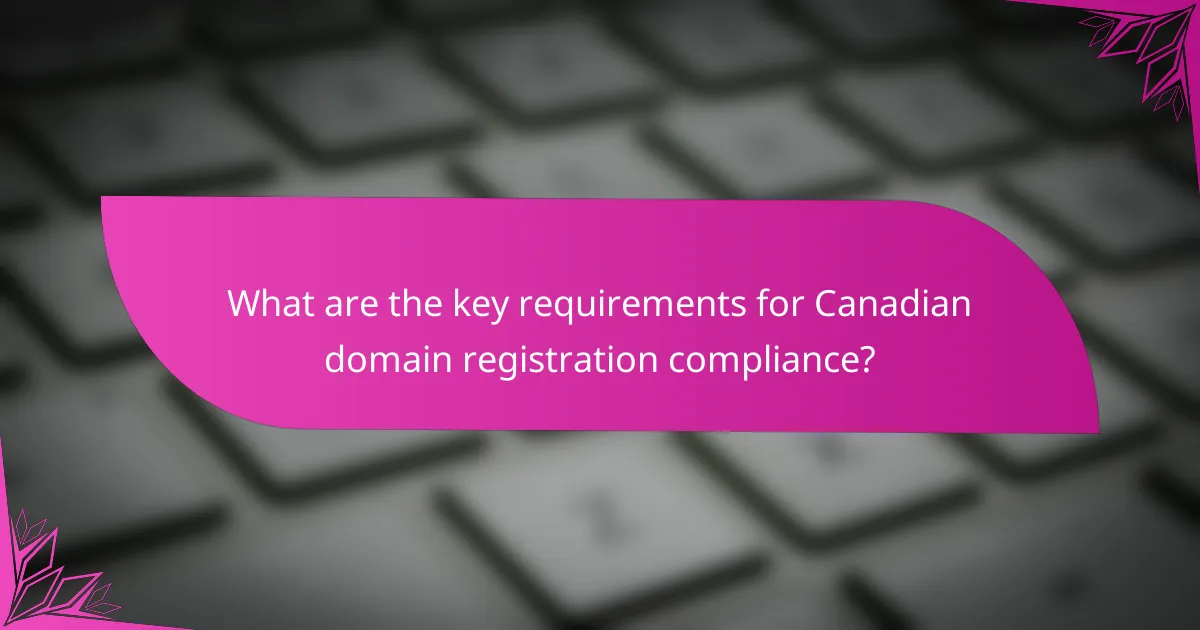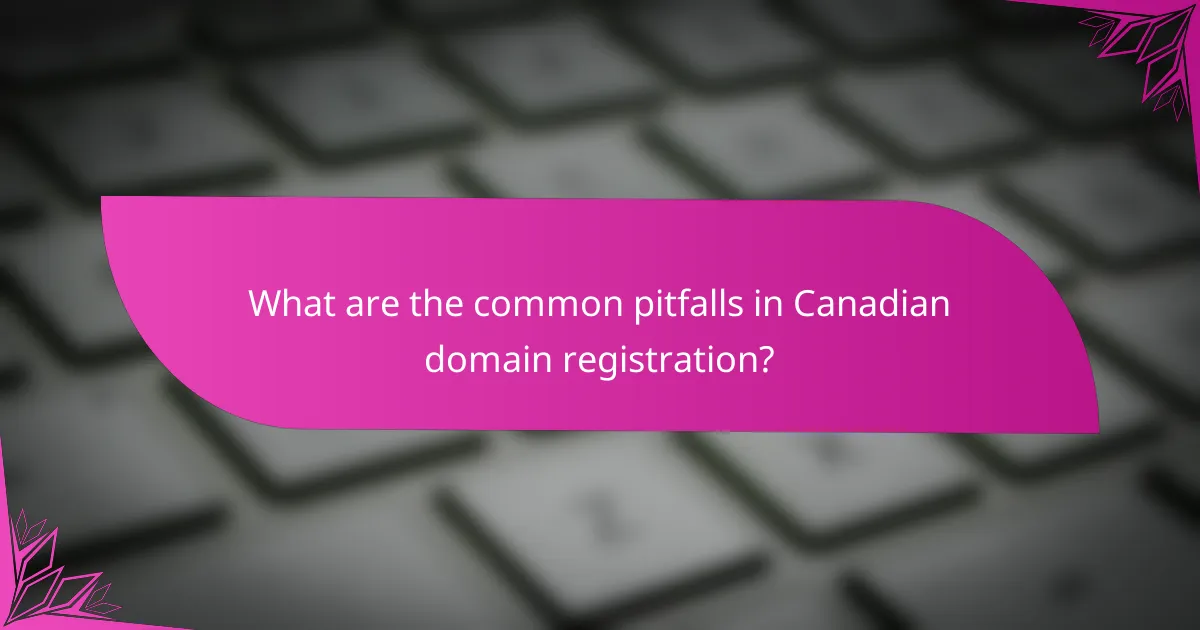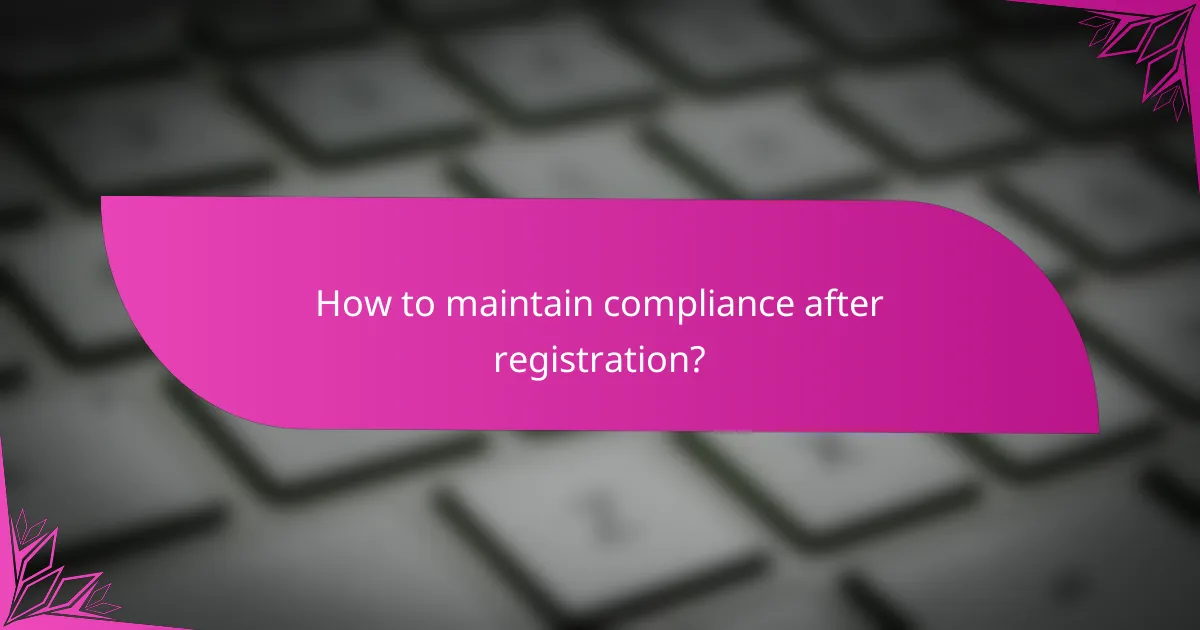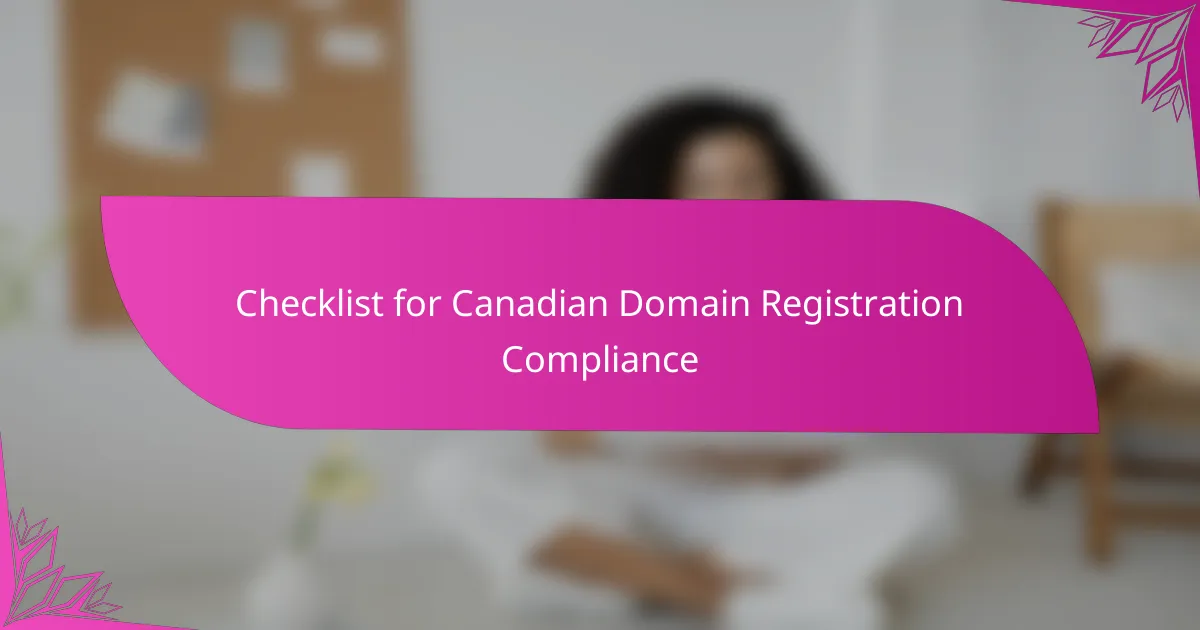Registering a domain in Canada requires adherence to specific regulations that ensure compliance with national standards. Key requirements include having a valid Canadian presence, using an accredited Canadian registrar, and following the guidelines established by the Canadian Internet Registration Authority (CIRA). Proper documentation, such as proof of residency and identification verification, is essential for successful registration.

What are the key requirements for Canadian domain registration compliance?
To register a domain in Canada, you must meet specific requirements that ensure compliance with national regulations. These include having a valid Canadian presence, registering with an accredited Canadian registrar, and adhering to the policies set forth by the Canadian Internet Registration Authority (CIRA).
Valid Canadian presence
A valid Canadian presence is essential for domain registration in Canada. This means that the registrant must be a Canadian citizen, a permanent resident, or a business entity registered in Canada. If you do not meet these criteria, you may need to partner with a Canadian entity to register your domain.
For businesses, providing a physical address in Canada is necessary. This ensures that the domain is linked to a legitimate Canadian presence, which is a key requirement for compliance.
Registration with a Canadian registrar
To comply with Canadian domain registration requirements, you must register your domain through a Canadian registrar accredited by CIRA. These registrars are authorized to manage .ca domains and ensure that all registrations meet national standards.
When selecting a registrar, consider factors such as pricing, customer support, and additional services offered. It’s advisable to choose a registrar with a solid reputation and experience in handling .ca domains to avoid potential issues.
Adherence to CIRA policies
Adhering to CIRA policies is crucial for maintaining compliance with Canadian domain registration. CIRA has established guidelines that govern the registration and management of .ca domains, including rules about domain eligibility, transfer, and renewal.
Familiarize yourself with these policies to ensure that your domain remains in good standing. Common pitfalls include failing to renew your domain on time or not updating your registration information, which can lead to loss of ownership. Regularly review CIRA’s policies to stay informed about any changes that may affect your domain.

How to choose a Canadian domain registrar?
Choosing a Canadian domain registrar involves selecting a provider that is accredited, offers competitive pricing, and provides reliable customer support. It’s essential to assess these factors to ensure compliance with Canadian regulations and to meet your specific needs.
Accredited registrars list
To ensure compliance with Canadian domain registration, start by checking the list of accredited registrars provided by the Canadian Internet Registration Authority (CIRA). This list includes registrars that meet CIRA’s standards for reliability and service. Using an accredited registrar helps guarantee that your domain registration is secure and compliant with Canadian regulations.
Some well-known accredited registrars include GoDaddy, HostPapa, and Webnames.ca. Each of these registrars has a proven track record in the Canadian market and offers various domain-related services.
Pricing and services comparison
When comparing pricing and services, consider the annual registration fees, renewal costs, and any additional services offered, such as privacy protection or web hosting. Prices for domain registration in Canada typically range from CAD 10 to CAD 30 per year, depending on the registrar and the domain extension.
Additionally, look for bundled services that may provide better value, such as email hosting or website builders. Some registrars may offer discounts for multi-year registrations, which can be a cost-effective option.
Customer support evaluation
Effective customer support is crucial when choosing a domain registrar. Evaluate the support options available, such as live chat, phone support, and email assistance. A registrar that offers 24/7 support can be beneficial, especially if you encounter issues outside of regular business hours.
Read customer reviews and testimonials to gauge the quality of support provided. Look for registrars that have a reputation for quick response times and knowledgeable staff, as this can save you time and frustration in the long run.

What documents are needed for registration?
To register a domain in Canada, you typically need to provide proof of Canadian residency, business registration documents, and identification verification. These documents ensure compliance with Canadian regulations and help establish your eligibility for domain ownership.
Proof of Canadian residency
Proof of Canadian residency is essential for domain registration. This can be demonstrated through various documents such as a utility bill, bank statement, or government-issued ID that clearly shows your name and Canadian address.
Make sure the document is recent, ideally within the last three months, to avoid any issues during the registration process. If you are a business owner, you may also provide proof of your business address in Canada.
Business registration documents
If you are registering a domain for a business, you will need to provide relevant business registration documents. This includes your business license or incorporation documents that confirm your business’s legal status in Canada.
Ensure that these documents are up-to-date and reflect your current business name and address. This helps establish legitimacy and aligns with the requirements set by Canadian domain registrars.
Identification verification
Identification verification is crucial for confirming the identity of the domain registrant. Acceptable forms of ID include a Canadian driver’s license, passport, or any government-issued identification that includes your photo and personal details.
When submitting your ID, ensure that it is not expired and that all information is clear and legible. This step helps prevent fraud and ensures that the domain is registered under the correct individual or entity.

What are the steps for registering a .ca domain?
Registering a .ca domain involves a few straightforward steps, including selecting a registrar, completing an application, and submitting necessary documents. Following these steps ensures compliance with Canadian regulations and secures your desired domain name.
Step 1: Select a registrar
The first step in registering a .ca domain is to choose an accredited registrar. Look for registrars that are members of the Canadian Internet Registration Authority (CIRA), as they are authorized to handle .ca domain registrations. Popular options include GoDaddy, Namecheap, and 1&1 IONOS.
When selecting a registrar, consider factors such as pricing, customer support, and additional services like web hosting or email. It’s wise to compare a few registrars to find one that fits your needs and budget.
Step 2: Complete the application
Once you’ve selected a registrar, you need to fill out the domain registration application. This typically involves providing your contact information, including your name, address, phone number, and email. Ensure that all information is accurate, as it will be used for domain ownership verification.
Some registrars may offer a simplified application process, allowing you to register multiple domains at once. Be mindful of any additional options or services you may want to include, such as privacy protection or domain forwarding.
Step 3: Submit required documents
After completing the application, you may need to submit specific documents to verify your eligibility for a .ca domain. This could include proof of Canadian citizenship or residency, or documentation showing a connection to Canada, such as a business registration.
Check with your chosen registrar for their specific document requirements, as these can vary. Ensure that you submit all necessary documents promptly to avoid delays in the registration process.

What are the common pitfalls in Canadian domain registration?
Common pitfalls in Canadian domain registration include neglecting regulatory guidelines, choosing non-Canadian registrars, and failing to provide adequate documentation. These mistakes can lead to registration delays, additional costs, or even loss of domain rights.
Ignoring CIRA guidelines
Ignoring the Canadian Internet Registration Authority (CIRA) guidelines can result in non-compliance and potential loss of your domain. CIRA mandates that all .ca domains must have a Canadian presence, which includes specific eligibility criteria that must be met.
To avoid issues, familiarize yourself with CIRA’s policies, including the need for a valid Canadian address and the requirement to maintain accurate contact information. Regularly review these guidelines as they may change over time.
Using non-Canadian registrars
Using non-Canadian registrars can complicate the registration process and may lead to compliance issues. While some international registrars offer competitive pricing, they may not fully understand Canadian regulations, which can result in complications.
Opt for registrars accredited by CIRA to ensure compliance with local laws and regulations. This will help streamline the registration process and provide better support for any issues that may arise.
Inadequate documentation
Inadequate documentation is a frequent issue that can delay or prevent domain registration. Canadian domain registrars typically require proof of eligibility, such as business registration documents or identification for individuals.
Ensure you gather all necessary documents before starting the registration process. This may include government-issued ID, business licenses, or other relevant paperwork. Double-check that all documents are up-to-date and clearly legible to avoid unnecessary delays.

How to maintain compliance after registration?
Maintaining compliance after registering a Canadian domain involves regular updates, timely renewals, and staying informed about policy changes. These actions ensure that your domain remains active and adheres to the Canadian Internet Registration Authority (CIRA) regulations.
Regular updates of contact information
Keeping your contact information up to date is crucial for compliance with CIRA regulations. This includes ensuring that your administrative, technical, and billing contacts are current to avoid any disruptions in service or potential domain disputes.
To maintain accurate records, review your contact details at least once a year or whenever there are significant changes in your organization. Use the CIRA online portal to make updates easily and verify that the changes have been processed.
Renewal of domain registration
Renewing your domain registration is essential to prevent loss of ownership. CIRA typically requires annual renewals, and failing to renew on time can result in your domain being put on hold or even released back to the public.
Set reminders for renewal dates at least 30 days in advance. Consider enabling auto-renewal through your registrar to simplify the process and avoid lapses in registration.
Monitoring CIRA policy changes
Staying informed about changes in CIRA policies is vital for ongoing compliance. CIRA periodically updates its policies regarding domain registration, ownership, and management practices, which can affect your domain’s status.
Subscribe to CIRA newsletters or regularly check their website for updates. Engaging with community forums or industry groups can also provide insights into upcoming changes that may impact your domain registration strategy.
